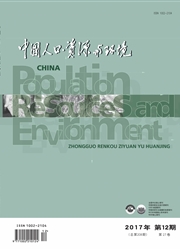

 中文摘要:
中文摘要:
随着我国城市化进程加快,城市发展与环境保护之间的矛盾日益突出,城市环境效率逐渐成为了社会广泛关注的焦点。文中应用基于投入导向的超效率DEA模型,分别对2007和2011年我国31个省会城市和计划单列城市的环境绩效进行了评价,并利用面板数据模型分析了环境绩效变动的影响因素。结果表明:我国仅有少数城市的环境绩效达到了DEA有效,大部分城市的经济-环境协调状况欠佳,环境绩效具有一定的提升空间。从2007到2011年,大部分城市的环境绩效有所改善,且部分城市的改善幅度较大,但仍有少数城市的环境绩效有所降低,包括上海、拉萨、南昌、合肥和石家庄。城市财政能力对城市环境绩效的影响不显著,产业结构、人口规模和经济增长变动对环境绩效的提高具有抑制作用,而城市对外开放程度则具有促进作用。
 英文摘要:
英文摘要:
With the sustained and rapid growth of China's urbanization level,the contradiction between the urban development and environmental protection is becoming aculeate increasingly; environmental efficiency in the course of urbanization has become the social focus gradually. Based on the connotation of environmental performance( EP) defined by World Business Council for sustainable development( WBCSD),we evaluated the urban environmental performance of 31 provincial capitals and cities specially designated in the State Plan in 2007 and2011 respectively by using Super-efficiency model of Data Envelopment Analysis( DEA),and then the impacts of driving factors on EP were analyzed by applying panel data model. The results indicate that there were only few cities in China that their environment performance is DEA efficient,most of the cities were in poor coordination of economy-environment and there was still more room for environmental performance. From 2007 to 2011,most of the city's environmental performance had improved,and some cities had been significantly improved,but there were still a few of the city's environmental performance reduced,including Shanghai,Lhasa,Nanchang,Hefei and Shijiazhuang. The impact of financial power of urban government on urban EP was not significant. Industrial structure,population scale,and economic growth had great negative influence on EP,but the openness of urban had positive influence on EP.
 同期刊论文项目
同期刊论文项目
 同项目期刊论文
同项目期刊论文
 Inventorying heavy metal pollution in redeveloped brownfield and its policy contribution: Case study
Inventorying heavy metal pollution in redeveloped brownfield and its policy contribution: Case study Urban ecological footprint analysis: a comparative study between Shenyang in China and Kawasaki in J
Urban ecological footprint analysis: a comparative study between Shenyang in China and Kawasaki in J Emergy-based assessment on industrial symbiosis: a case of Shenyang Economic and Technological Devel
Emergy-based assessment on industrial symbiosis: a case of Shenyang Economic and Technological Devel 期刊信息
期刊信息
